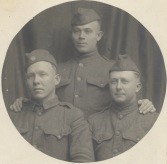
Corporal Irvin Greene Coley (center) with two of his fellow doughboys before returning to the United States in 1919. Those wool uniforms were miserably hot when they returned to Texas.
For the last six years I have enjoyed personal research on World War I. It’s the reason I started my blog and now continue it as well as my newspaper column. I am not a military historian nor am I a fan of what happened throughout the world between August 4, 1914 and November 11, 1918. But my paternal grandfather was involved in the American Expeditionary Forces (AEF) after the United States entered the war in April 1917. As a child and teenager I listened to his stories, not about battles but about his life after the war as a surveyor for the U. S. Army.
He delighted in telling me about the events of November 11, 1918. Everyone on the Western Front knew that a cease-fire would take place at 11:00 AM on the 11th day of the 11th month. Every artillery officer wanted to be known as the one who fired the last shells. Finally at eleven o’clock that morning a deathly silence fell from the North Sea to the Swiss border. By three o’clock that afternoon the men heard the first birds chirping since they arrived in the summer of 1917. It was as if a giant sigh was released up and down the Western Front.
My grandfather, Corporal Irvin Greene Coley, served in Company A, 315th Engineers of the 90th Division, a division composed primarily of volunteers and draftees from Texas and Oklahoma. He celebrated his twenty-third birthday the day after the Peace Treaty. On June 27, 1919 he was honorably discharged from the United States Army at Camp Bowie, Texas.
During the war, engineers were responsible for barbed wire in front of the trenches, repairing the roads full of potholes and ruts, hastily constructing telephone lines across France and other issues. While he spent little time in the trenches, he carried a gas mask, a horrible looking affair that scared the daylights out of this child.
When the war was over, Coley and three of his fellow engineers were issued tripod and surveying equipment, pads and pencils for mapping, a bicycle for each man and a pistol for the group. Since my grandfather was the ranking non-commissioned officer it was his duty to carry the pistol.
The first night out the men knocked on the door of an Alsace family to ask for food and shelter. The family was suspicious of the Yanks. The only food was heavily watered down cabbage soup. Since communication was impossible, they all gathered around the fire to keep warm and guardedly watched others. At one point, when my grandfather shifted in his chair the pistol fell to the floor. He said he was never so scared in his whole life.
Shortly thereafter, the men found housing with other families. My grandfather stayed with a young miller, his wife, and two daughters who thought my grandfather was a super-hero. He always had candy for them in his pocket.
The men were ordered to map the entire region, especially roads. Many years later my grandfather met James A. Rutherford, my husband’s first accounting partner. Mr. Rutherford was a spotter pilot in WWII who used those maps. It was a heartwarming visit enjoyed by both men.
On May 19, 2018 I will present a program entitled “Life on the Texas Homefront” in Hallettsville, Texas at the Friench Simpson Memorial Library. Osa Brinkman will also speak about Gold Star Mothers. If you are in the area, stop by for the free lectures and a visit with the speakers. Times are 8:30 AM to 3:30 PM.
